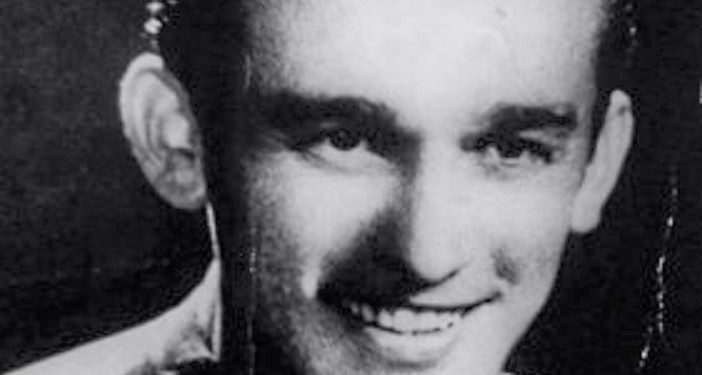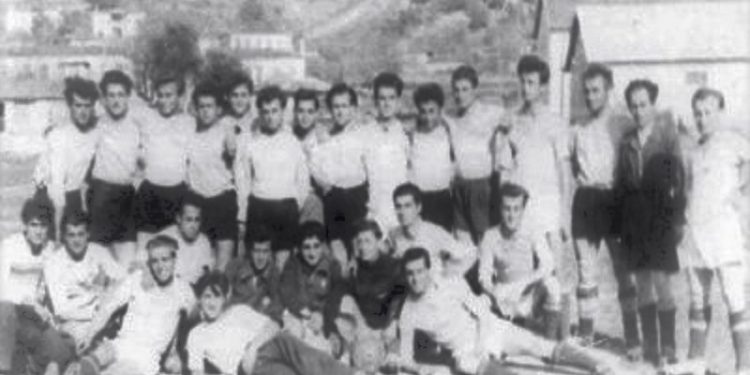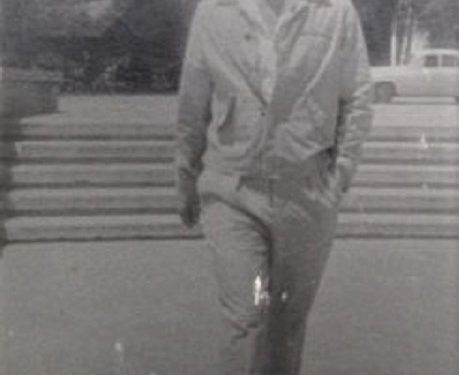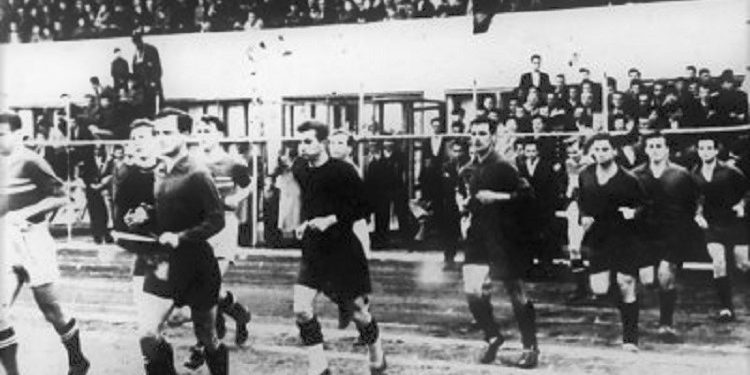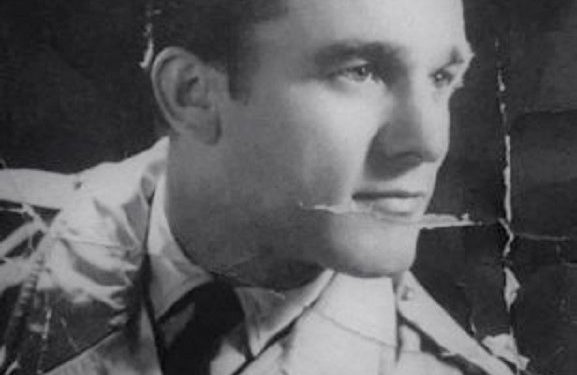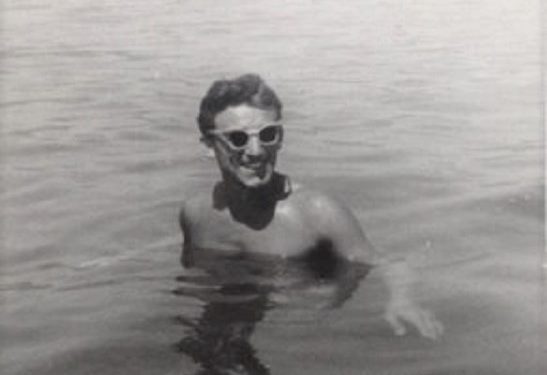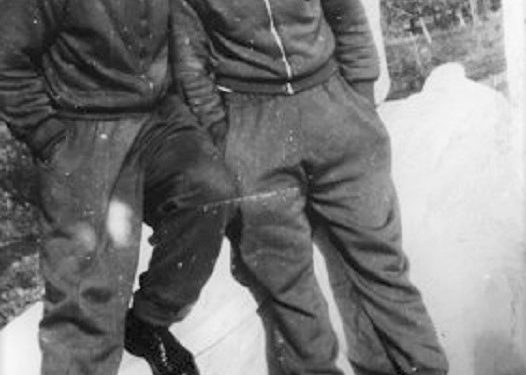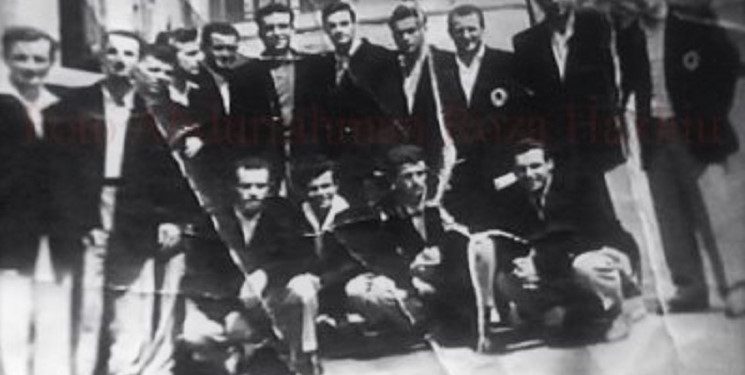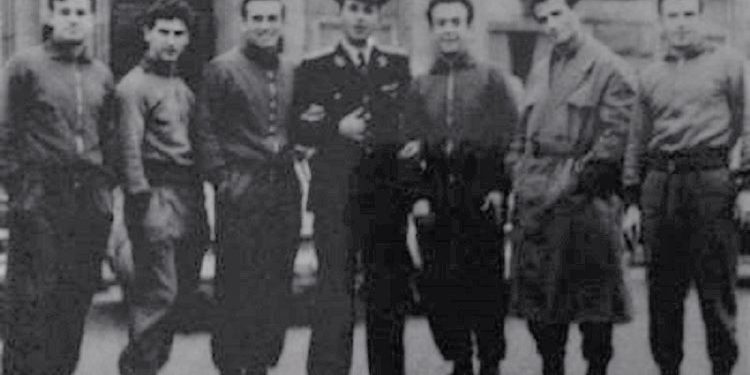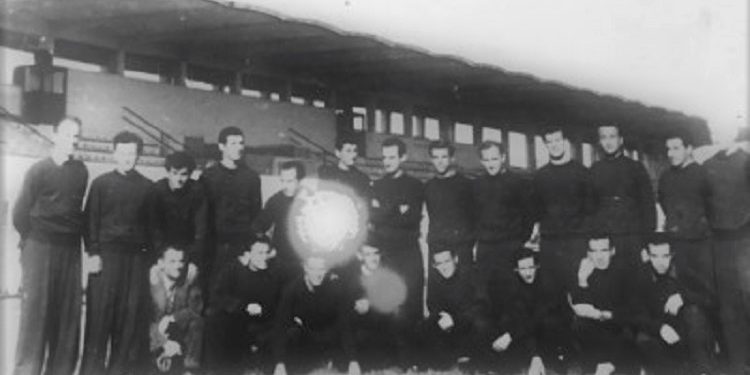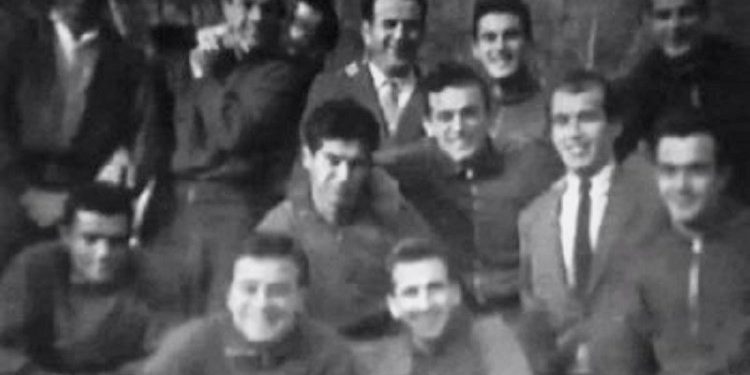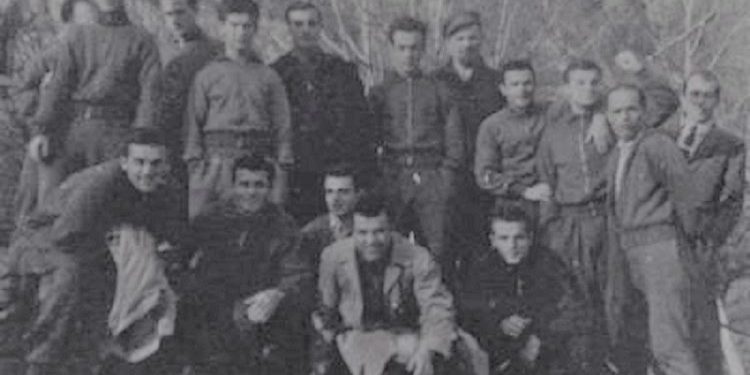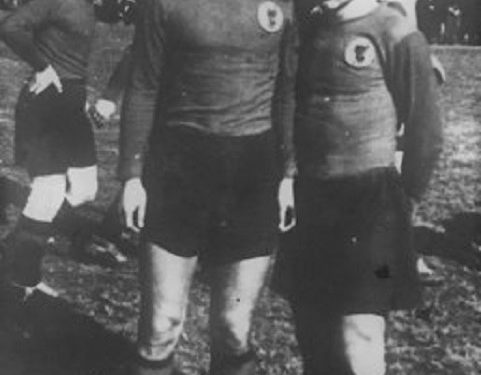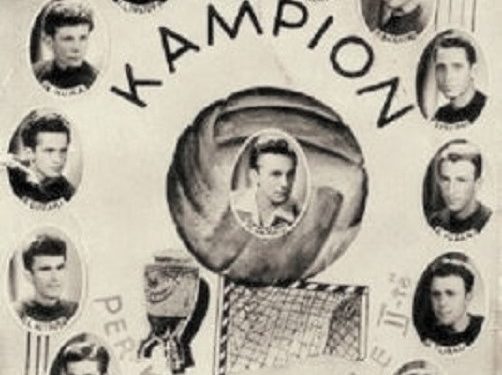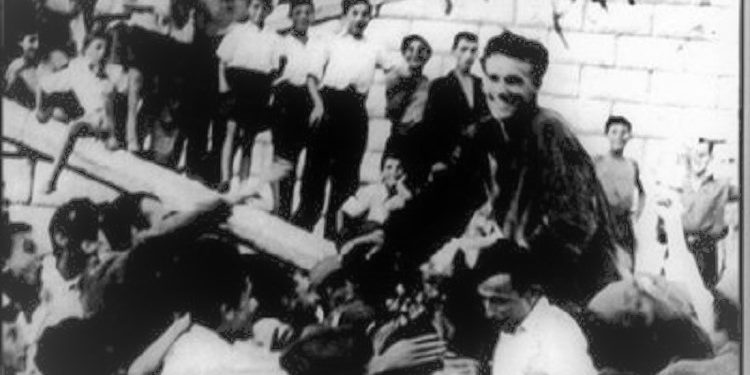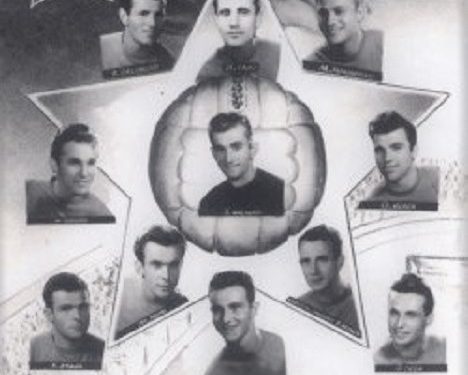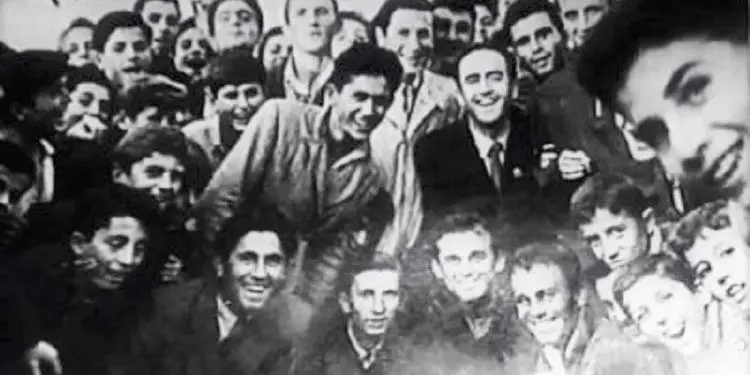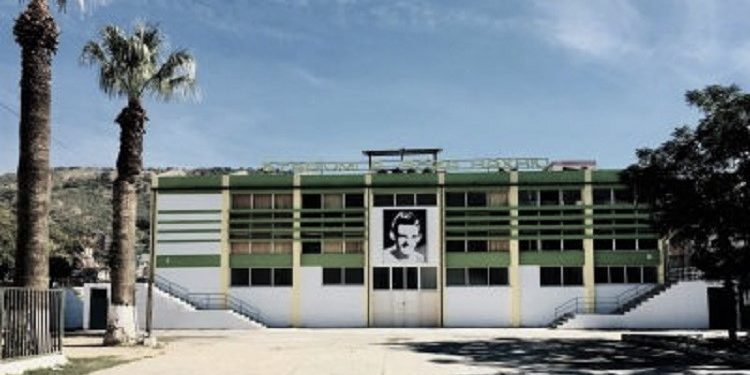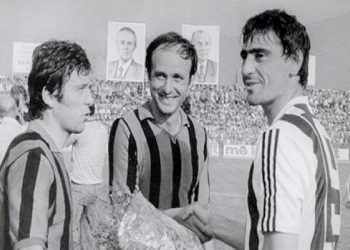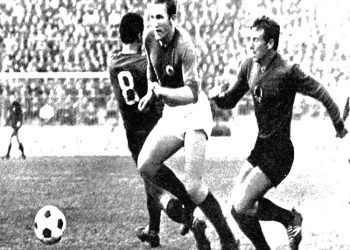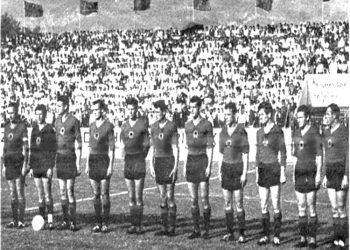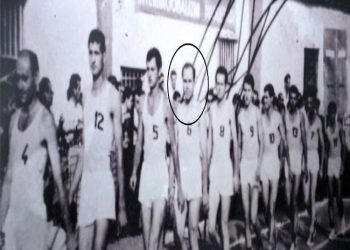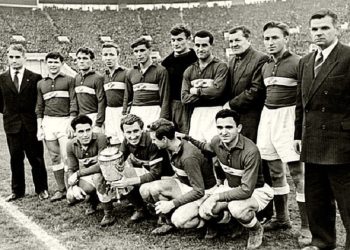By Kevin Haxhiu
Memorie.al publishes the unknown story of Abdurrahman Haxhiu, sucker of one of the most famous families of the city of Lushnja, who started playing football in the first years after the war with the youth team “Traktori” and was further activated with Kavaja “Besa” team, to come to the well-known teams of the capital, “Dinamo” and “Partizani”, where he would play for several championships in a row alongside the big names of Albanian football, such as Loro Boriçi, Refik Resmja, Kolec Kraja etc., also standing out as a scorer. Haxhiu’s brilliant career in several international matches with the teams of the capital and then with the national team of Albania, where he excelled in several matches, until 1958 during a “battle” with the Bulgarian team “Plevenit”, in the city with the same name, would be severely injured with a large wound to the head, which would cause the life of the charming Lushnja boy at the age of 35 to be taken. The magnificent funeral of the football legend of Lushnja, which was attended by hundreds of people from several other districts, such as Kavaja, Durres, Tirana, etc., and the honor given to him by his fellow citizens, baptizing the stadium of Lushnja with the name “Roza Haxhiu”.
Abdurrahman Roza Haxhiu or Roza Haxhiu, as everyone knows, was born in the city of Lushnja in the neighborhood “Congress of Lushnja” on September 30, 1930 and he was the son of Bajram Haxhiu, one of the members of the commission that initiated the convening of the Congress of Lushnja in 1920. As a child, Roza dreamed of becoming a footballer and what started as a child in the green field of her homeland and would end up right there in the European green field, from a deadly blow to the head.
Roza Haxhiu was a prominent Albanian footballer of the 1950s-’60s, a rare talent and first class goal scorer with the Albanian national team, as well as with several teams where he was successfully motivated starting with Lushnja, “Dinamo” -on, of Tirana, “Besa” of Kavaja and “Partizani” of the capital. Abdurrahman Roza Haxhiu lived very little, about three and a half decades, and devoted almost half of his life to football, the sport of the heart. In fact, if we were to say that the sport has “its martyrs”, Roza is one of those warriors who really fell on the green field of the stadium, fatally injured by a deadly blow to the head, which interrupted them. in the middle of the life he so beautifully knew how to live.
This happened when he wore the red jersey of the “Partizani” team, honoring not only his colors, but also the nationwide sport. Thus, he is one of the most prominent “martyrs” of partisan and Albanian football. “Versatile footballer who played in many positions, excellent physical condition, perfect user of the ball with both feet, intelligence expressed in all technical-tactical components, high correctness in the game, the spirit of the team, few words and a lot of work “, Roza would be considered by those who knew her and who played with her.
The beginnings of football with the youth of Lushnja in the years 1945-‘47
In 1945-‘47 Roza Haxhiu became active with the youth team of “Traktori” of Lushnja where she distinguished herself as a starter. His extraordinary talent would also stand out from Dilaver Toptan, the Tirana sports “polyglot”, who was a physical inspector, teacher, coach and football player in the city of Lushnja in the years 1947-1949. Seeing Roza Haxhiu’s great skills, Dilaver Toptani intervened and sent Roza for a specialization course as a coach in Tirana, a course run by Soviet (Russian) cadres. During the championship of 1948-’49, Roza’s name crosses the borders of Lushnja, because in 1950 he wore the jersey with the team “Besa” of Kavaja, where he stood out as a midfielder with a wide vision, excelling in many meetings he held with that team where he was active in all matches.
Shines in international meetings with “Partizan”
Only a year later, after he “caught the eye”, to the football specialists, he transferred to the “Partizani” team, being active alongside prominent names of Albanian football, such as Loro Boriçi, Refik Resmja, Kolec Kraja, etc. And less than two years later, Boriçi (now a coach), together with Jançen, entrust the jersey of the team of the Albanian representative that would participate in the World Youth Festivals. The roads are already open: in 1955, when the “Dinamo” of the capital would face the “Dozha” of Budapest, Roza is called as a reinforcement in the ranks of the blues of the capital under the leadership of the great Zihni Gjinali. Regarding the game of the football player Haxhiu, the great Hungarian of those years, Suza, would say after the matches: “He (Roza Haxhiu) is a football player of European caliber”. In that match where Roza had the duty of a free defender, the Hungarian team threw on the field the best players of that time, but even though it was on its own field and in front of their ardent fans, they could not get more than one draw.
With the Albanian National Team
Although the Hungarian players were of European caliber at that time, “Dinamo” with its game was able to attract the attention of foreign specialists. From the good games that took place even after this meeting, Roza Haxhiu became active and played for the Albanian national team. It could not be a coincidence that Roza Haxhiu was activated with the Albanian representative at a time when the red and black team held several international events and players with outstanding qualities were needed. Roza’s incomparable technique and quality could not escape the attention of the specialists and coaches of the Albanian Football Federation.
Thus at that time one can not easily forget the good games played by the national team and the victories over Czechoslovakia 3-0, as well as the victory with Poland. In those matches, Roza Haxhiu gave her best, becoming a symbol of Albanian football. In the following two years, he is the ubiquitous member of the “Partizani” team, being considered impenetrable, agile, technical, with a wide range for the game, and above all, with a great spirit. Contemporaries undoubtedly remember Roza Haxhiu who scored the third and last goal of the derby match “Partizani” – “Dinamo” at the national stadium “Qemal Stafa”, which ended with the deserved victory of Partizan 3: 1 and which gave Partizani ”the title of champion of 1957 in the 20th national championship. To complete the complex figure of Roza Haxhiu, as a footballer, you can not leave without mentioning the unforgettable meetings of “Partizani” in Leipzig, East Germany, in September 1958, where along with the whole team, special contribution to winning Roza Haxhiu also gave silver medals. In 1958, “Partizani” participates in a friendly tournament in Bulgaria, where in one of the strong meetings with the team of “Pleven”, the city of the same name, which ended 2: 1 in favor of our team, Roza is badly damaged.
Triumphs with the team “Traktori” coming out in the first category
Although injured, with a high spirit of sacrifice, he played for more than 1 year with the team of “Dinamo” of Tirana, to then return to his hometown. When he returns to his hometown, not detaching himself from football, he takes over the leadership of the Lushnja team, but also playing himself, which was allowed by the regulations of that time. After two finals with “Erzeni” of Shijak, won 3-2 and 6-2, Roza Haxhiu makes the then “Tractor” to enter for the first time in the elite of the country’s teams, thus realizing a dream old-fashioned musketeers. Thus, the sports “crew” consolidated by Abdurrahman Haxhiu, triumphs in the championship of the second category, being declared champions in 1960.
The entry in the first category opened the “path” of Lushnja football to be represented with dignity in 1960 in the national championship with the teams “Shpresa” (player under 21 years old), together with the teams of “Partizani”, “Dinamo”, “Vllaznia”, “Flamurtari”, “Skënderbeu”, “Labinot”, “Besa” and “Tomorri”, etc., occupying a place of honor. In May-July 1963, Roza, already a football specialist, was assigned to select and prepare a group of 13-14 year olds for the National Spartakiad that took place every year in the pioneer camp “Qemal Stafa” on the beach of Durres.
The injury in the match that took his life
In the period February-March 1964, he worked as a teacher of Physical Education in the high school of the city of Lushnja “18 October”. But unfortunately, Poldov’s strike in 1958, when “Partizan” took part in a friendly tournament in Bulgaria, where Roza was seriously injured, he had not “forgotten”. It even turned into a monstrous disease that would threaten Roza Haxhiu’s life. After many bureaucratic efforts, he manages to secure a “pass” to operate in Italy. But it was too late… ?! Thus, on May 19, 1964, he “kidnapped” Roza from the bosom of family, friends, relatives, teammates. Abdurrahman (Roza) Haxhiu left as a rarity, as he was fortunate enough to be separated from life, deserving of respect, appreciation and eternity. Thousands of sports fans from Lushnja and from other districts, the band from Kavaja playing fun music led the funeral procession. Just with his hands outstretched, Uncle Bami (father) looks around to see the misery of the people. Leaning on the head of the coffin, with tears in his eyes he said: “Ahh mor son, I did not know that you had so many friends and comrades”.
Numerous posthumous honors and appreciations
But Roza Haxhiu was only physically separated from life, as he has remained immortal in the memory of thousands upon thousands of sports fans who followed him on the green fields. Thus he was honored posthumously in 1971, with the high title “Merited Master of Sports”. Honors for his name and figure would continue even after the ’90s, as in 1999 by the Minister of Culture, Youth and Sports, Edi Rama he was honored with the title “Honor of Albanian Sports”, in 1994 by The Municipality of Lushnje was honored with the title “Honorary Citizen”, in 2016 by the Albanian Football Federation was honored with the title “Plaque”. To always remember this legend of Albanian football, as a sign of respect for the contribution given by this footballer and coach in Lushnja and Albanian football, the stadium of his hometown in Lushnja, was baptized with the honorable name “Abdurrahman Roza Haxhiu”.
Why was he known as Roza?
Abdurrahmani, the beauty who would be called “che bella rosa”, (“what a beautiful rose”) by the Italian doctor and the hospital nurses who visited him there from 1947, would remain that nickname forever. The name “Roza” would be further reinforced by Dr. Ihsan Çabej after 1950, to then spread outside the hospital premises and remain forever engraved in the minds of hundreds of thousands of sports fans and beyond. They called him “Roza-Trëndafil” because that was how he shone in life and on the green field.
Abdurrahman (Roza) Haxhiu, was not only a great footballer, but he is also remembered as a model husband of Liljana, the dancer of the State Assembly of Folk Songs and Dances of Albania and also as a parent devoted madly after three children: Rozeta, Arben and Adnand. For sports in general and football in particular, the contribution of the Haxhiu tribe is a “bouquet of flowers” among which stands out a “Rose” he named: Roza Abdurrahman Haxhiu./Memorie.al




